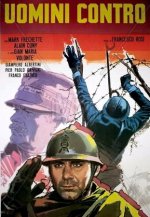On the same Kubrick' s "Paths of glory" theme, the beautiful italian film "Uomini contro" ( "Many wars ago" in the english version) with Gian Maria Volonté:
"On the Isonzo front during World War One around 1916-17, Italian army officers demand far too much of their men. Time after time the soldiers are forced to leave their trenches in attempts to storm the enemy positions, always with the same horrific result. The Austro-Hungarian machine guns inevitably mow them down. In one attack a major is killed, and subsequently every sixth man of his platoon is chosen to be executed by a firing squad of his comrades, in some bizarre kind of compensation for the killed officer. And it gets only worse"...

"On the Isonzo front during World War One around 1916-17, Italian army officers demand far too much of their men. Time after time the soldiers are forced to leave their trenches in attempts to storm the enemy positions, always with the same horrific result. The Austro-Hungarian machine guns inevitably mow them down. In one attack a major is killed, and subsequently every sixth man of his platoon is chosen to be executed by a firing squad of his comrades, in some bizarre kind of compensation for the killed officer. And it gets only worse"...


